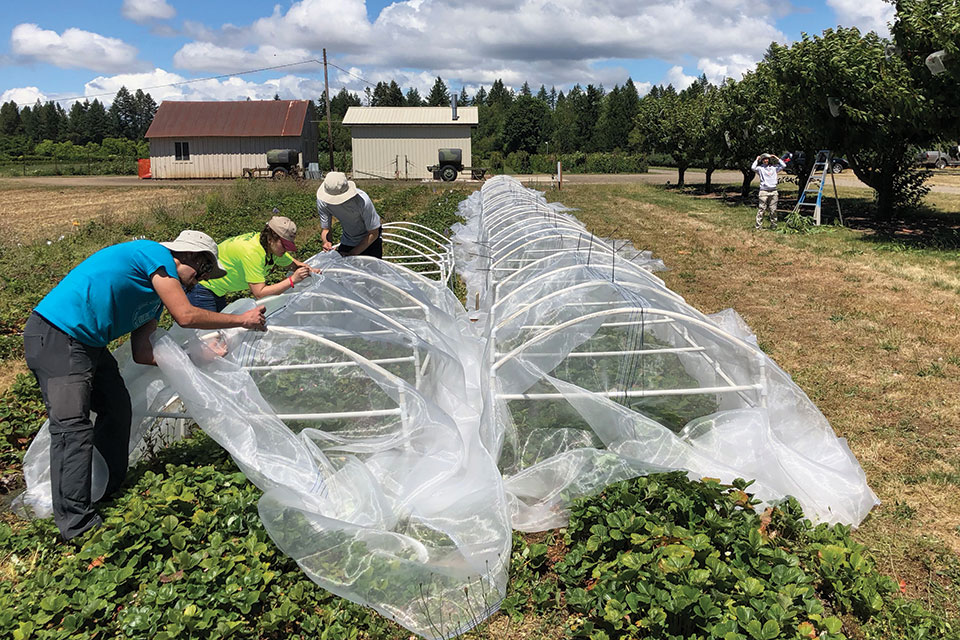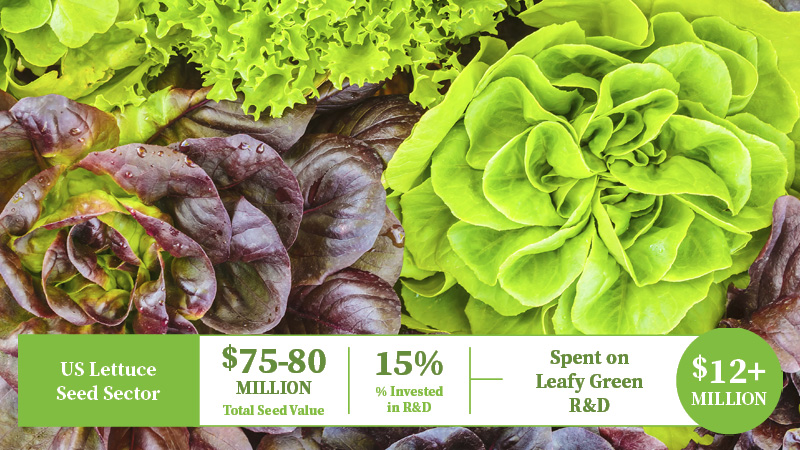Two New Promising Organic Products Can Help You Control Fruit Pest

Researchers in Vaughn Walton’s lab examine the effectiveness treatments of Decoy on strawberries at Oregon State University’s Lewis-Brown Farm in Corvallis, OR, in 2018. (Photo: Vaughn Walton)
Since its discovery in 2008 in the U.S., spotted wing drosophila (SWD) has frustrated growers and researchers alike, as its mere presence has interrupted integrated pest management (IPM) programs.
However, two promising products may encourage revisiting an integrated approach to SWD control. These products are proprietary food-grade substances and are organic by nature, to boot. Vaughn Walton’s lab at Oregon State University (OSU) is testing the products. Walton is an entomologist with OSU’s Department of Horticulture.
Promising Skin Thickener
The first product, called Hydroshield, is a skin thickener for use on cherries and blueberries. Walton’s research focuses on blueberries and cherries as most other fruits SWD favors would be too soft for the product to be effective. Early research by Walton and his team showed that increased fruit firmness deterred SWD egg laying.
“Then, I worked with my colleague Clive Kaiser to develop Hydroshield to formulate a product that is easy to use, while producing the desirable qualities,” Walton says.
In testing Hydroshield, Walton’s research team found an approximate 10% increase in fruit firmness with cherries and similar statistics with blueberries.
“We did find significant reduction, up to 91% reduction in egg laying,” Walton says of research in blueberries. “Over very extended periods, too, up to 30 days after application.”
For cherries, there’s about a 25% reduction in egg laying.
“I think with that specific product, it’s very dependent on fruit type and firmness of the berries of that fruit type,” he says. “You’re going to get a firmer berry, and you’re going to get a significant reduction in egg laying.”
Walton tested Hydroshield on three varieties of blueberries and one cherry variety. He says this product would be a good fit for growers with berries and cherries for the export market.
Some post-doctoral students in his research lab are currently looking at how Hydroshield actually deters egg laying. Walton says it’s not as simple, as the firmer fruit makes oviposition more difficult for females.
Hydroshield is pending commercialization and would be ready for production and use in 2020 if a commercial partnership is reached.
Promising Applications
The second product, Decoy, has been tested on a wider-range of fruits – strawberries, blackberries, blueberries, cherries, raspberries, and wine grapes. Decoy is applied on the ground and not directly on the fruit.
“Decoy was a spin-off of experimental work conducted on Hydroshield,” Walton says.
Since Decoy’s discovery in 2017, Walton and his research team have found a 67% reduction in egg laying, on average. For blueberries it’s close to 90% in certain time periods, strawberries it’s 86%, and in wine grapes it’s about 50%.
“Work conducted during 2018 has shown a 21-day range of efficacy at 67%,” he says. “We also know how many point surfaces to apply it to per field.”
What’s most impressive is in the trials. Decoy is applied to every 18th vine, bush, or plant with the 21-day efficacy at 67% egg laying reduction.
“To us, that was a big surprise. We’re very excited. We’re doing more and more trials on it,” Walton says. “We thought it was a mistake. You’re always doubting your observations.”
Walton says Decoy will be subject to further testing this year with the hope of trying it in commercial plantings this season.
Complete System
Walton says both Hydroshield and Decoy will be great to integrate into a total management system. There are other studies on cultural practices for SWD reduction such as drip irrigation vs. overhead cooling, weed fabrics, and pruning, and these two new products could be integrated with other practices.
“It’s not an easy bug to deal with,” he says.
He’s also optimistic that both Hydroshield and Decoy will be more tools for growers to use in lighter pest pressure times, like early in the season, saving the powerful chemistries for when they’re really needed.
“With higher pressure, growers still might need pesticides,” he says. “In organic systems, there are limited applications for Entrust (Corteva). [Growers] could wait with that. Instead of applying the compound early and not have anything later, they could use other techniques, then they could use [Entrust] later with pressure.”
Walton also says he’s impressed with how well both Hydroshield and Decoy work with rainy weather and will have zero preharvest interval, which will “help with the logistics of farming.”
Walton says this integrated approach will likely be the best way to manage SWD in the future.
“Now, we’re not just telling growers to spray pesticides anymore,” he says. “We can also apply these other compounds to lower the use of pesticides, like any integrated pest management or whole-system approach.”










